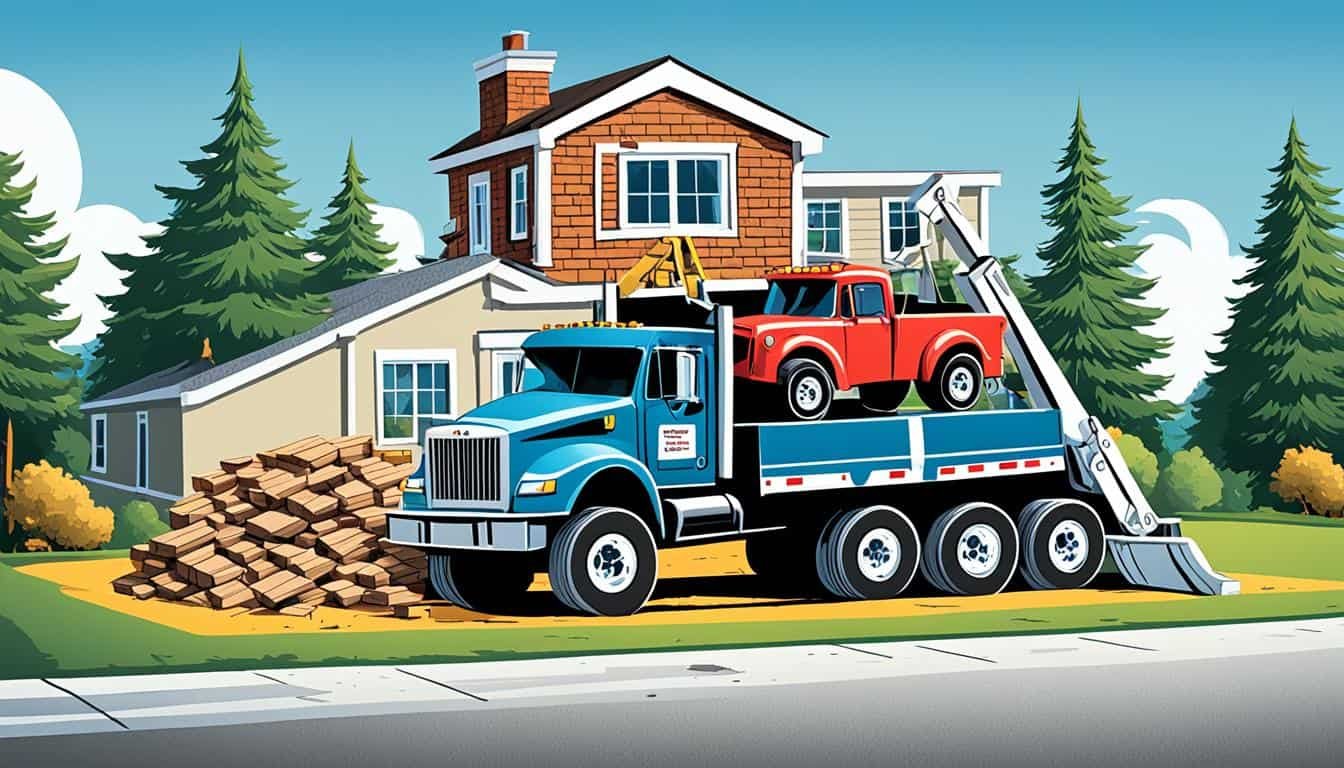The journey from one home to another, often termed as “relocating residences,” involves not just a physical transfer of location but also an emotional and psychological transition. The phrase “moving home” encapsulates the intricate steps that individuals and families undertake, embodying a phase laden with challenges and anticipations. Often interchanged with “house shifting” and “property transportation,” these terms form the bedrock of dwelling transfer terminology. The act of relocating residences is more than just shuttling belongings; it represents the transfer of life’s moments and memories from one space to another, a significant chapter in the tale of human mobility.
Key Takeaways
- “Moving houses” and “residential relocation” are terms that intimately reflect the complete overhaul of one’s living environment.
- The term “house shifting” underscores the physical aspect of transporting items to a new dwelling space.
- Understanding the term “property transportation” is crucial for grasping the scope of relocating physical assets during a move.
- Dwelling transfer terminology is rich with nuances that address both the logistical and sentimental facets of moving.
- Relocating residences captures the complexity and cultural importance of the migration from one home to another.
Understanding the History and Terms of House Moving
Delving into the story of human movement from one home to another unveils a treasury of house moving jargon and traditions deeply embedded in various cultures worldwide. Behind every term and custom lies a history that enriches the experience of relocating residences, making it more than just a physical transition.
The Roots of “Housewarming” and Its Cultural Significance
With origins lost in antiquity, the concept of a housewarming party symbolizes more than the sharing of a new abode with friends and family. It is steeped in the practicality and spiritualism of bygone eras when bringing firewood as gifts helped to warm new homes and dispel any lurking negativity. Today, this lively occasion has become an endearing milestone marking the commencement of treasured moments in a new dwelling.
The Importance of Tradition in House Moving Terminology
In the tapestry of house moving terminology, each thread represents a tradition that has served to ground us in the journey of life. The gestures of offering bread and salt, or placing a pomegranate near the household’s altar, have transcended time to become symbolic hellos to new neighbors and protective talismans for a home’s future.
How Regional Customs Influence House Moving Jargon
From the French pendaison de crémaillère, which celebrates the successful completion of a home, to the Indian grihapravesha, these regional house moving customs and their associated terminology offer a glimpse into the diverse ways communities celebrate the age-old process of setting down roots in new soil. Whether through the Southern United States’ “Food Pounder” or other community house shifting traditions, these rituals highlight a shared but varied human experience in the universal act of moving houses.
What are moving houses called?
Throughout diverse cultures and various corners of the globe, the event of changing your living quarters is universally recognized, despite the multitude of terms used to describe it. In essence, **moving houses**, or **relocating residences**, is a pivotal transition that impacts every facet of one’s life. This pivotal journey from one abode to another is enriched by a rich tapestry of customs and shared experiences, all falling under the broad canopy of **residential relocation**, a term that succinctly captures the full spectrum of shifting one’s habitat—be it physical, administrative, or emotional.
While terms like **house shifting name** and **house moving terminology** may point to the physical aspects of the process, they only scratch the surface of the deeper cultural connotations associated with such moves. Specific regional phrases such as France’s pendaison de crémaillère, India’s grihapravesha, or the Southern United States’ “Food Pounder” gathering highlight the unique societal significances and communal practices tied to entering a new home. This lexicon extends beyond mere logistic language, refracting the universal human condition of transitioning spaces through the prism of local customs.
Regardless of whether one is shifting within familiar city borders or venturing across continents, **what are moving houses called** extends beyond terminology; it signifies an epoch of transformation. Each packing box and each farewell to a neighbor is steeped in age-old traditions and the evolution of societal norms. The phrase ‘moving houses’ isn’t simply about the transfer of possessions; it’s a rite of passage, signifying the onset of a new chapter in one’s life story, carried out under the umbrella of **residential relocation** — a shared global narrative punctuated by unique local idioms. When facing the challenge of **how to plan a house move**, individuals navigate a maze of logistics and emotions, tackling the practicalities of packing and finding a new residence while processing the bittersweet mix of nostalgia and excitement. It’s a time for evaluating priorities, adjusting to new surroundings, and building connections in unfamiliar communities. Despite the universality of the experience, each house move is as unique as the individual or family orchestrating it.
What are moving houses called?
What is the general term for moving one’s residence?
The general terms for moving one’s residence include “moving houses,” “relocating residences,” “residential relocation,” “moving home,” “house shifting,” “property transportation,” and “dwelling transfer.” Each of these terms can be used to describe the comprehensive process of changing one’s home from one location to another.
What does the term “housewarming” originate from?
The term “housewarming” originates from a bygone tradition where guests would bring firewood to new homes to light fires in all the fireplaces, warming the house and symbolically warding off evil spirits. Today, it refers to a gathering held after moving into a new home to celebrate the new residence.
How do traditions affect house moving terminology?
Traditions such as the exchange of bread and salt, the Greek custom of placing a pomegranate at the domestic altar, or the gifting of pineapples have influenced house moving terminology throughout history. These customs underscore the symbolic nature of moving to a new house and the significance of such traditions across different cultures.
How do regional customs impact house moving jargon?
Regional customs like the French pendaison de crémaillère, the Indian grihapravesha ceremony, and the Southern US “Food Pounder” party contribute unique terms to house moving jargon. They emphasize the localized practices and rituals that are part of the moving process, enriching the vocabulary surrounding moving houses with cultural specificity.
What is the cultural significance of a “housewarming” party?
A housewarming party holds cultural significance as a celebration marking the start of life in a new dwelling. Historically, it has been a way to showcase the new home to friends and family, as well as to invite good fortune and warmth into the living space.
Why is tradition important in house moving terminology?
Tradition is important in house moving terminology as it carries the history and symbolic gestures of hospitality, protection, and good wishes that are significant when settling into a new home. These traditions have evolved into terms that are still used today.
In what ways do regional customs shape house moving terminology?
Regional customs shape house moving terminology by introducing specific phrases and rituals that reflect the cultural identity and practices of a particular area. These terms, such as pendaison de crémaillère or grihapravesha, lend depth and complexity to the language associated with moving houses.
What are other terms used interchangeably with “moving houses”?
Terms such as “relocating residences,” “house shifting,” “property transportation,” and “residential relocation” are often used interchangeably with “moving houses.” These variations all refer to the process of changing one’s living space.
Does “moving houses” only imply the physical relocation of belongings?
No, “moving houses” implies more than just the physical relocation of belongings. It encompasses the entirety of moving one’s life, including the emotional and cultural aspects that come with establishing oneself in a new environment. It is a significant life event that often includes various traditions and rituals.




